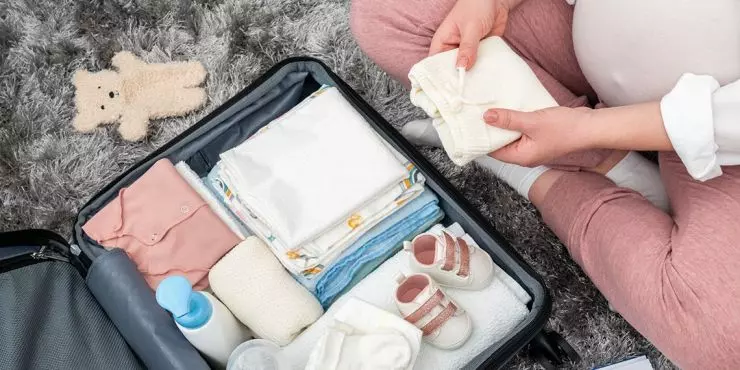
As your due date approaches, the excitement of meeting your baby grows—but it’s natural to feel a little nervous about being fully prepared. Regular prenatal visits are a great way to ease pre-delivery anxiety and address any concerns with your doctor, including plans for labor and delivery. Another practical step is packing your hospital bag ahead of time. Having everything ready ensures you can focus on welcoming your little one instead of worrying about forgotten essentials. But don’t worry if you can’t get your bag packed. Most hospitals have supplies of basic essential items, just in case your trip to the hospital is a last minute emergency. For most deliveries, however, you’ll have plenty of time to piece your hospital bag together. Let’s break down what to pack for yourself, your baby, and your partner, so you’ll feel confident and ready for the big day.
When Should You Pack Your Hospital Bag?
It’s a good idea to have your hospital bag packed and ready to go by around 36 weeks of pregnancy. Of course, every pregnancy is different, and babies don’t always arrive on schedule, so having your bag prepared a few weeks early can provide peace of mind.
Essentials for Mom
You’ll be spending at least 24 to 48 hours in the hospital after a vaginal delivery (and longer if you have a cesarean), so packing for comfort and practicality is key. Here’s what to include:
Clothing
- Robe or comfortable pajamas: Choose something loose-fitting and nursing-friendly if you plan to breastfeed.
- Non-slip socks or slippers: Hospital floors can be cold, and having warm, non-slip socks or slippers will keep you cozy.
- Comfortable going-home outfit: Remember, your body will still look about 5-6 months pregnant, so choose something stretchy and comfortable.
- Nursing bras or tanks: If you’re breastfeeding, pack at least two nursing-friendly tops. Breast/nipple pads are also helpful to absorb any milk that may leak between feedings.
- Maternity underwear: High-waisted, stretchy underwear can be more comfortable, especially if you’ve had a C-section.
Toiletries
- Travel-sized essentials: Toothbrush, toothpaste, shampoo, conditioner, face wash, and deodorant.
- Lip balm: Hospital air can be very dry.
- Hair ties or headbands: Keep your hair out of your face during labor and after delivery.
- Moisturizer: Your skin may feel drier than usual, so pack a small lotion.
- Postpartum pads or disposable underwear: While the hospital provides some, you may prefer your own.
- Nipple cream: If you’re planning to breastfeed, this can help with initial soreness.
Comfort Items
- Pillow or blanket: While the hospital provides bedding, having your own pillow or a soft blanket can make you feel more at home.
- Snacks: Labor can be long, and while you may not be able to eat much during active labor, snacks are great for after delivery or for your partner during labor.
- Reusable water bottle: Staying hydrated is essential, and a water bottle with a straw can make sipping easier.
- Phone charger: Opt for a long cord since outlets can be far from the hospital bed.
- Relaxation tools: Items like essential oils, a massage roller, or a favorite playlist can help you feel calm during labor.

Essentials for Baby
Your baby doesn’t need much for their first few days, but there are some must-haves to pack:
- Car seat: Ensure your car seat is installed properly before heading to the hospital.
- Onesies or sleepers: Pack 2-3 newborn outfits, including one for going home. Choose soft, easy-to-snap clothing.
- Receiving blanket: This is great for swaddling or as an extra layer in the car seat.
- Hat and socks: Even in warmer months, newborns need help staying warm.
- Baby mittens: These can prevent your baby from accidentally scratching their face.
- Diapers and wipes: The hospital usually provides these, but it doesn’t hurt to have a small stash on hand.
- Going-home outfit: Pick something special for those first photos and the trip home.
Essentials for Your Partner or Support Person
Your partner or support person will also benefit from having their own mini bag of essentials:
- Comfortable clothing: They’ll likely spend long hours at the hospital, so pack a few comfy outfits.
- Snacks and drinks: Hospital food isn’t always convenient or available late at night.
- Pillow and blanket: Many hospital chairs or sofas aren’t the most comfortable for sleeping.
- Entertainment: A book, tablet, or headphones can help them pass the time during quieter moments.
- Phone charger: Just like you, they’ll want to keep their phone charged for photos and updates.
Optional Extras
While not essential, these items can add an extra layer of comfort and convenience:
- Thank-you notes or small gifts: Consider bringing a small token of appreciation for your nurses and doctors.
- Notebook or journal: Use this to jot down questions for your care team or to document your baby’s first moments.
- Pacifier: Most hospitals provide these, but you may prefer to bring your own.
FAQs About Hospital Bag Packing
1. What if I forget something?
Don’t worry! Hospitals are equipped with many of the essentials, and your partner or a family member can always run home or to a nearby store to grab anything you’ve forgotten.
2. Can I bring my own labor gown?
Yes! While hospitals provide gowns, some moms prefer to wear their own for added comfort. Just be sure it’s something you don’t mind getting messy.
3. How many bags should I pack?
Aim for one main bag for you and one smaller bag for your baby’s essentials. Your partner can also have their own small bag to keep things organized.
4. Should I pack for a longer stay just in case?
It’s a good idea to pack an extra set of clothes and a few additional toiletries in case of a longer stay due to complications or a C-section.
A Thoughtful Approach to Packing
Packing your hospital bag is a small but meaningful step in preparing for your baby’s arrival. It’s not just about the items you’ll bring—it’s about creating a sense of readiness and peace of mind as you get closer to meeting your little one. Take the time to plan ahead, involve your partner in the process, and remember that the hospital staff is there to support you every step of the way.
You’ve got this, mama!
Other articles you might find helpful:
Caring for a Newborn
Exercising While Pregnant
Post Delivery – What to Expect After a Vaginal Delivery
Top 10 Ways to Make Pregnancy More Comfortable